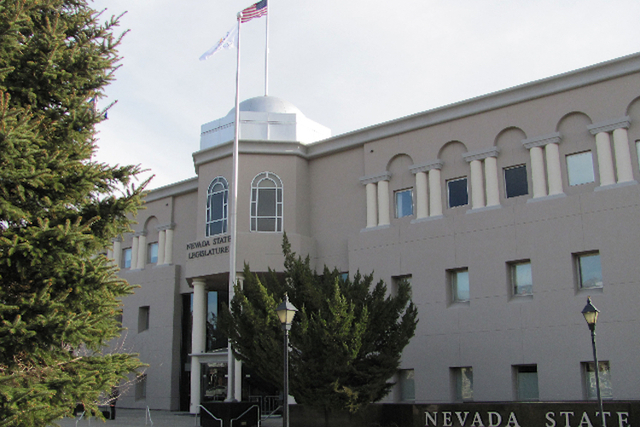Marijuana, cybersecurity among debates to happen in Nevada Legislature
CARSON CITY – Nevada’s first potential tax on recreational marijuana will be debated in the 2017 Legislature.
That’s just one issue ahead in the session, which starts Monday . Lawmakers will look at cybersecurity, explore a reduction of the state’s prison population and consider funding for public education.
Here’s a look at the top issues this session:
PUBLIC EDUCATION: Funding for public education will be a top priority for lawmakers and Gov. Brian Sandoval as the state looks to build on the student achievement efforts from last session. Sandoval has proposed more than $100 million in new money for programs including Zoom and Victory Schools. But there will be battles, particularly over Sandoval’s recommendation to put $60 million into a controversial GOP program that would give parents money to place their children in private schools.
POT TAX: With voters approving possession of up to 1 ounce of marijuana for recreational use, legislative action is needed to implement the law. Issues ranging from standards for driving under the influence to places where users can light up will be considered by lawmakers. Sandoval has also proposed a 10 percent tax on retail marijuana sales, which is expected to raise $70 million to help fund public education.
HIGHER EDUCATION: Nevada’s higher education system is in line for big funding increases in Sandoval’s 2017-19 budget, including $26 million for UNLV’s fledgling medical school. The $142 million for the Nevada System of Higher Education includes $21.3 million for enrollment growth at the University of Nevada, Reno, $37.4 million for UNLV and $21.4 million for career and technical education at the state’s four community colleges. But lawmakers are likely to debate all of the priorities, including $83 million for a new engineering building at UNR.
INMATE POPULATION: Steps to reduce the prison population include shipping 200 inmates to out-of-state facilities and putting more funding toward helping inmates eligible for parole obtain housing and develop plans for life out of prison.
CYBERSECURITY: Sandoval has hackers in his sights. The governor has proposed about $3.5 million for the creation of an Office of Cyber Defense. The office, which would be part of the Nevada Department of Public Safety, would be a place where other entities, including local government agencies and private industry, could come for assistance and guidance.
STATE PARKS: Sandoval’s $15 million state parks proposal would bring a slew of improvements and additions. In Southern Nevada, it would create Tule Springs State Park, a 315-acre parcel of fossil-rich land in North Las Vegas. The funding also would kick-start development of Walker River State Recreation Area on more than 12,000 acres in western Nevada and bring about myriad improvements throughout existing parks, such as Wi-Fi in campsites.
RIGHT TO DIE: Consideration of efforts to give terminally ill patients the right to end their lives is expected to draw passionate testimony on both sides when lawmakers hold hearings. One bill seeks to allow doctors to prescribe life-ending medication to terminally ill patients. A similar bill was brought during the 2015 Legislature, but no hearing was held and the measure was not considered.
DEATH PENALTY: Last year, state officials didn’t receive any bids from pharmaceutical companies when seeking proposals for drugs needed for lethal injections. One legislative proposal would change the maximum criminal penalty to life in prison without the possibility of parole.
MEDICAID: Uncertainty over the fate of the federal Affordable Care Act will play into Medicaid funding. Sandoval expanded Medicaid eligibility under the law to include adults without dependent children. The number of participants soared to more than 630,000, with the federal government picking up the tab for the newly eligible. But the federal government’s share is being reduced under the original law and could be eliminated if the law is repealed. Sandoval’s $8.1 billion general fund budget proposal includes an additional $73 million to cover medical inflation costs and $173 million more for Medicaid caseload growth and adjustments to the federal matching assistance formula.
Sandra Chereb and Sean Whaley contributed to this report.
Contact Ben Botkin at bbotkin@reviewjournal.com or 702-461-0661. Follow @BenBotkin1 on Twitter.
Nevada lawmakers meet in regular session in odd-numbered years. Under the state Constitution, regular sessions commence on the first Monday in February and are restricted to 120 days. The 2017 session ends at midnight June 5.
There are deadlines that must be met along the way. The pace picks up in mid-April, when legislation, unless it is exempt, must pass the committee in the house it was introduced or else it dies. About a week later the legislation must clear the house of origin or meet the same fate.
On May 1, the Economic Forum, an independent panel of fiscal experts, meets to make its final general fund revenue projections for the two-year budget cycle that begins July 1. The forum's forecast must be used to balance the budget, and any additional spending authorized by lawmakers must be accompanied by new revenue.
The forum's projections clear the way for Assembly and Senate money committees to begin resolving budget differences and closing individual budget accounts.
Bills must pass committees in the second house by mid-May; and the full second house about seven days later to stay alive. It's not unusual, though, for bills once left for dead to be resurreced in the waning days or hours of a session, when rules are suspended and bills can speed through the process in the matter of hours — or even minutes.
Final budget and authorization bills are introduced in final week to ensure passage by the June 5 deadline.
— Sandra Chereb





















